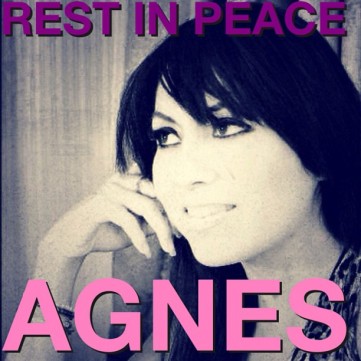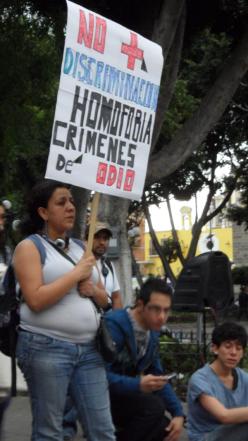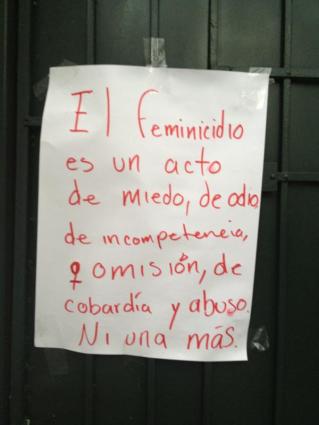
A tribute to Agnes Torres circulating on the internet. "My dream is to live in a better culture, one where hospitality and respect are the core values. Every morning I get up and I do much more than write, so that the next day I may awaken in my own dream. The only thing left to find out is, what will you do to share my dream?"
Civil and human rights groups in Puebla, Mexico circulated a petition on Tuesday March 12th calling for anti-discrimination legislation and protection for LGBTTTI* persons in the state of Puebla, Mexico.
Nine groups wrote the petition in response to the murder of Agnes Torres Hernandez, an activist who was the victim of an apparent hate crime because of her gender. Torres’ body was discovered on Saturday, March 10th in a ravine near a highway in Atlixco, Puebla; her throat had been slit and part of her body had been burned. News reports indicated that she had died of blood loss and that she had been tortured.
Torres had worked to promote legislation against discrimination on the basis of sex or gender identity in Puebla; among other demands, the petition asked that the law be established in her name.
Secretario General de Gobierno for the state of Puebla, Fernando Manzanilla Prieto, met with representatives from those civil rights groups on Tuesday. In a press conference after the meeting Manzanilla avoided giving a specific number of homicides that could be classified as hate crimes, saying, “todos los crímenes se dan por odio. ¿A poco hay de otro tipo?” (All crimes are caused by hate. Could there be any other kind?)
Fueled in part by a strong internet response, protesters marched in Torres’ memory through the center of Puebla, the capital city, on Monday afternoon and evening. Thousands of messages expressing anger, grief, and condemnation of the murder appeared on social networking sites such as Facebook and Twitter, and the hashtag #AgnesTorres became a trending topic on Twitter.
In addition to her work as an activist, Torres was also a psychologist specializing in gender identity. She was 28 years old and is survived by her parents and sister.
For more information on Agnes Torres’ life:
English-language news report on Torres’ death
A tribute by Alejandra Gómez Macchia
An interview with Agnes Torres’ mother Vinicia Hernández
The text of the petition and its introductory letter follow.
Dear comrades,
We are soliciting your help, once again, so that the crimes against Agnes Torres and five other murdered people do not go unpunished, and moreover so that conditions change and these crimes do not happen again.
If you agree with our position, we request your signatures, either as individuals or as organizations. We ask that groups affiliated with political parties abstain from signing as a group and instead sign as individuals.
Please send signatures via email to observatoriodsyr@gmail.com. We will be closing the petition on Wednesday, March 14th at noon Central Standard Time.
Thank you.
——————————————————-
March 12, 2012
Puebla, Mexico
Given conditions of extreme vulnerability and violence against the Lesbian, Gay, Transgender, Transexual and Intersex population of the state of Puebla,
Given the authorities’ negligence to make appropriate public policies addressing respect, inclusion, and diversity,
Given the ominous silence of legislators, who have consistently put off work that addresses civil rights and discrimination, allowing discrimination to instead take on life in this realm,
Given the inaction by the state’s justice and Human Rights defense agencies, which have allowed for the continued existence of hate crimes, for a state of impunity and for a torn social fabric,
The signing organizations and individuals demand:
1) The resolution of all crimes against members of the LGBTTTI community, using the topic of “gender-based hate” as an investigatory focus, with emphases on transphobia and homophobia. This process must happen with all possible speed and facility, as the law dictates the procurement of justice must occur.
2) That, once and for all, the State of Puebla enact a Law to Prevent and Eradicate Discrimination perpetuated for any motive, regulated and reflected in public policies immediately.
3) The establishment of a working group to generate a law on sex and gender identity for the state of Puebla, which will be known as The Agnes Torres Hernández Law. The working group must include civil society organizations and specialists in the topics at hand.
4) The establishment of clear and firm punishments for all public servants who commit homophobic or discriminatory acts, especially when those acts cause people to become victims of those discriminatory crimes.
5) That the Human Rights Commission create a specialized office for topics related to Sexual and Reproductive Rights, with an expert staff, an appropriate budget, and a public agenda which has been discussed and approved of by Civil Society Organizations.
6) That the State Attorney General open a specialized agency for gender-based crimes, with focuses on feminicide and hate crimes including homophobia, transphobia, biphobia and lesbophobia; with a trained staff; and with a designated, appropriate, sufficient budget.
7) That the State Governor once and for all decree May 17th to be the State Day Against Homophobia, with organized activities and a state-wide budget to fight this atrocious problem.
8) That all public agencies within each state municipality implement permanent training programs on sexual diversity for their staff, to be planned and regulated by a multilateral agency, including participation by civil society organizations.
9) That there are guarantees and protection for those of us who dedicate ourselves to the defense of Human Rights in Puebla; this includes not only responsive actions, but, more importantly, preventative measures.
10) Given present Mexican electoral context (2012 is an election year), we want to be clear that we reject possible political or partisan gain with this citizen-directed document.
Sincerely,
Comité Orgullo Puebla (Puebla Pride Committee)
Observatorio Ciudadano de Derechos Sexuales y Reproductivos AC (Citizen Observation Group for Sexual and Reproductive Rights, Civil Association)
Vida Plena, No dejarse es Incluirse AC (Full Life, Civil Association)
Erósfera, Centro de Atención e Incidencia para la Salud y los Derechos Sexuales AC (Erósfera, Attention and Incidence Center for Sexual Health and Rights, Civil Association)
Red Democracia y Sexualidad (The Democracy and Sexuality Network)
El Taller Centro de Sensibilización y Educación Humana AC (The Public Awareness and Human Education and Workshop Center, Civil Association)
Asociación Jurídica Juvenil de Puebla AC (Puebla Youth Legal Association, Civil Association)
Radar 4º.
Red por los Derechos Sexuales y Reproductivos en México-Puebla (Sexual and Reproductive Rights Network in Mexico-Puebla)
*LGBTTTI means lesbian, gay, bisexual, transgender, transsexual, transvestite and inter-sex; it is a preferred acronym to refer to people on the sexuality spectrum or the gender-identity spectrum who are not heterosexual and/or gendernormative. A similar acronym commonly used in the US is LGBTQIA, for lesbian, gay, bisexual, transgender, questioning, intersex, or asexual.







